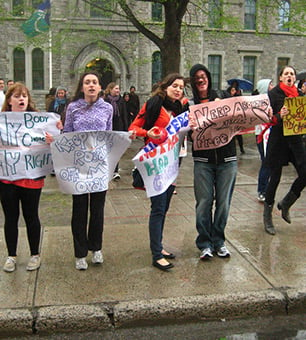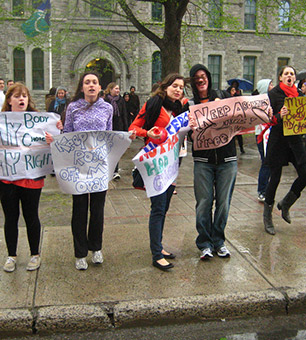 (Photo: Jenn Farr / Flickr)The “War on Women” isn’t just a war on women. Trans men and gender-non-conforming people are losing their rights too, and we need to rework how we frame these “women’s issues.”
(Photo: Jenn Farr / Flickr)The “War on Women” isn’t just a war on women. Trans men and gender-non-conforming people are losing their rights too, and we need to rework how we frame these “women’s issues.”
The last month has been particularly brutal for abortion rights activists and women’s health advocates, as state after state has proposed and/or passed various bills that restrict abortion access and undermine abortion care. In response, there has been a re-energized reproductive rights movement, with many across the nation stating that they “Stand With Texas Women” or “Stand With North Carolina Women.” But in this response, abortion rights activists have overlooked and dismissed a very important reality: Not everyone who has an abortion is a woman.
Abortion is so often framed as a women’s issue by both those who advocate for abortion rights and those who seek to dismiss abortion as frivolous. And for abortion rights, a movement that took root in the late 1960s and early 1970s, this makes sense. Prior to a deeper understanding and problematizing of gender and the way that it works, in our social construction, only women had abortions because only women could get pregnant. But in 2013, we should know better, and we need to do better.
At this crucial moment for reproductive freedom and abortion access, the abortion rights movement stands at yet another crossroads: How do we adequately address and include those who have abortions but are not women?
We must acknowledge and come to terms with the implicit cissexism in assuming that only women have abortions. Trans men have abortions. People who do not identify as women have abortions. They deserve to be represented in our advocacy and activist framework. Honestly, I am guilty of perpetuating that harmful myth, both in my rhetoric and framing. I often frame abortion restrictions as misogynistic attacks meant to control women’s reproductive lives, and that is true. But abortion restrictions also affect the lives of people who aren’t women, and they hinder trans men and gender-non-conforming people and others who were Designated Female at Birth (DFAB) from accessing abortion care, as well.
“Stand with Ohio Women” and the “War on Women” may be great rallying cries, but they also very clearly reiterate the notion that abortion is both solely a women’s issue and that only women have abortions. This can make those in the trans community feel excluded, and it can deter them from both seeking the abortion care they may need or becoming actively involved in abortion rights advocacy.
Leading the way on becoming more gender inclusive around the issue of abortion is the New York Abortion Access Fund (NYAAF), which recently agreed to shift its mission statement and values to reflect more gender inclusive language. NYAAF also created a Gender Inclusive Task Force to reach out to the LGBTQ communities and inform them that NYAAF helps fund abortions for all people, not just women. They state:
We want to make sure that NYAAF isn’t just working toward every woman’s right to access affordable abortion care, but every person’s right, regardless of their gender. We realized that embracing gender inclusivity is about more than not assuming the gender pronouns that our callers use or replacing ‘woman’ with ‘people’ everywhere on our website. Becoming gender inclusive is an important part of our values as an organization.
More abortion rights and abortion care organizations need to follow suit with NYAAF. But individual activists can take action on a smaller level, even without the official sanctioning of nonprofits and advocacy organizations. We can begin by listening.
Ellen, who identifies as transgenderqueer, notes that “the best thing [cisgender] allies can do is to be receptive to criticism and ask trans people for alternatives. When you do this, it shows that you’re listening and aware that your choice of language makes an impact.” As Ellen also highlighted, trans people often feel that they are a burden to cisgender (which means your gender identity is the same as the sex with which you were born) abortion rights activists when they call out the problematic and exclusionary language upon which we rely.
Beyond that, we should begin to accept and grapple with, on individual and community levels, what it means to frame abortion as a women’s issue and why we continue to be so reluctant or unable to be more gender inclusive. This requires effort, yes, but it is essential to our work and to a deeper understanding that reproductive justice does not only apply to women, but to all people. All people who need an abortion should be able to access one, and that does not solely apply to women.
I agree that restricting abortion rights is a misogynistic attempt to control women’s reproductive lives and undermine women’s reproductive autonomy. I firmly believe that misogyny lies at the heart of restricting abortion rights. But I also acknowledge that the misogyny of restricting abortion rights applies to trans* people, too. It affects a trans man who needs an abortion in North Dakota just as much as it does a cisgender woman in Texas. As Ellen so poignantly said, “this abortion debate is about agency, about choice and about attacks on our bodies,” and that includes those who are not women.
So yes, I stand with women. I also stand with trans men and gender-non-conforming people. Do you?
Here is a helpful glossary of trans, genderqueer, and queer terms.
Speaking against the authoritarian crackdown
In the midst of a nationwide attack on civil liberties, Truthout urgently needs your help.
Journalism is a critical tool in the fight against Trump and his extremist agenda. The right wing knows this — that’s why they’ve taken over many legacy media publications.
But we won’t let truth be replaced by propaganda. As the Trump administration works to silence dissent, please support nonprofit independent journalism. Truthout is almost entirely funded by individual giving, so a one-time or monthly donation goes a long way. Click below to sustain our work.
